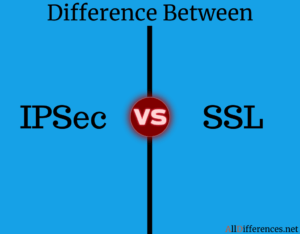Difference Between IPSec and SSL in Tabular Form
Contents
- SSL VPN is generally used to make the connection for a remote user using the SSL VPN client. E.g If someone wants to connect their work location or wants to access the server of their company from any location or from home they can access it through an SSL VPN in a secure channel.
- While in IPSec VPN Or Site to site VPN used to make the connections between HO and BO. e.g If any Enterprise company has an office in New York and their BO is in Mumbai and to make the connection between two sites in the secure channel we used IPSec connections. When I say secure channel that means no one can hack or steal any information.
- In conclusion, SSL VPN is used to make connections between a remote client to a site. IPSec VPN is used to make connections between two different sites.

Comparison Chart
| Parameters | IPSec | SSL |
|---|---|---|
| Position on the OSI model | Internet Layer | Between the transport layer and application layer. |
| Configuration | Complex | Simple |
| NAT | Problematic | No Problem |
| Software Location | Kernel Area | User area |
| Firewall | Not Friendly | Friendly |
| Installation | Vender Non-Specific | Vender Specific |
| Interoperability | Yes | No |
| Deploy | More expensive to deploy, support and maintain | Less costly to deploy, support and maintain |
| Application | IPsec is used to secure a Virtual Private Network. | SSL is used to secure web transactions. |
IPSec Protocol
- Internet protocol security (IPsec) is a set of protocols that provide security for Internet Protocol.
- It can use cryptography to provide security.
- IPsec can be used for the setting up of virtual private networks (VPNs) in a secure manner.
- Also known as IP Security.
SSL
- “Secure Sockets Layer.” SSL is a secure protocol developed for sending information securely over the Internet. Many websites use SSL for secure areas of their sites, such as user account pages and online checkout. Usually, when you are asked to “log in” on a website, the resulting page is secured by SSL.
- SSL encrypts the data being transmitted so that a third party cannot “eavesdrop” on the transmission and view the data being transmitted.
- Only the user’s computer and the secure server are able to recognize the data.
- SSL keeps your name, address, and credit card information between you and merchant to which you are providing it. Without this kind of encryption, online shopping would be far too insecure to be practical.
- When you visit a Web address starting with “https,” the “s” after the “http” indicates the website is secure.
- These websites often use SSL certificates to verify their authenticity.
